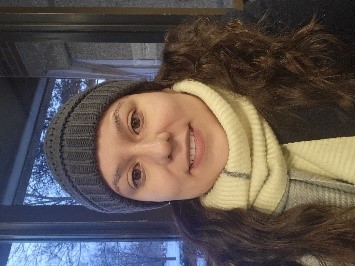Meet Estefania Gonzalez Alvarez
Written by Jaspreet Rishi in celebration of Graduate Student Appreciation Month

In honor of Graduate Student Appreciation Month, Arin Oestreich and Jaspreet Rishi would like to highlight SSR Trainees and familiarize ourselves with the wonderful young professionals who are members of SSR. This week, we interviewed Estefania Gonzalez Alvarez, a Ph.D. candidate in Dr. Aileen Keating’s lab at Iowa State University.
1. What is your current position and research project?
I am currently a Ph.D. candidate in Dr. Aileen Keating’s lab at Iowa State University. My research focuses on understanding how environmental chemicals like zearalenone and PFOA can cause ovarian dysfunction leading to temporary or permanent infertility and if an altered physiological status like obesity and heat stress can have additive effects on ovotoxicant exposure.
2. What attracted you to the field of reproduction?
I am from Guatemala City, Guatemala. I was first attracted to the female reproductive toxicology field after reading some of Dr. Keating’s work. Guatemala, as a developing country lacks laws and regulations, and women are especially neglected, thus becoming a vulnerable population exposed to xenobiotics. I believe that studying how environmental contaminants can affect the ovaries and how the physiological status might be additive to the xenobiotic-induced ovotoxicity is key to preventing fertility problems and other diseases in women and developmental problems. And being part of Dr. Keating’s lab has helped me gain tools that in the future might be helpful to generate data to improve laws and help women in my country.
3. Is there a mentor who has particularly influenced your career?
I have two mentors; both are women in science and a source of inspiration to younger generations of girls in the STEM field. The first one, MSc. Carolina Guzmán-Quilo introduced me to the toxicology field while I was an undergraduate student, and the second one is Dr. Aileen Keating, who has introduced me to the reproductive toxicology field. They have taught me to love my work and help people through my research, always doing it with the highest standards, values, and ethics.
4. What advice do you have to other students considering a Ph.D. in reproduction?
I would tell them to be patient with themselves and trust themselves. Sometimes the work can be overwhelming but don’t give up. It will be worth it. The work you are doing in reproduction will be beneficial for someone in the future.

